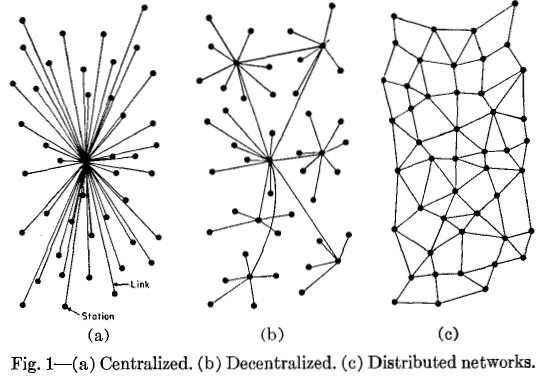1
I'm here to address some FUD and questions from people who think Plebbit won’t succeed. Let’s talk about why peer-to-peer is better than all those other social media platforms
list of reason why P2P is better than:
- mastodon / lemmy / activitypub
- Instance admins can delete user accounts and communities. Instance admins can block other instances. It's too difficult to run your own instance, you need to buy a domain name, server, DDOS protection, set up SSL, etc.
- No mechanism for a community owner to communicate a challenge to post to his community, so impossible to prevent spam.
- bluesky
- Bluesky instances cannot delete user accounts and communities (as long as they are backed up somewhere else), but they can block user accounts and communities. Since running your own instance is difficult, your user account and community will be blocked most of the time and you won't be able to reach your users.
- No mechanism for a community owner to communicate a challenge to post to his community, so impossible to prevent spam.
- nostr
- Bluesky instances cannot delete user accounts and communities (as long as they are backed up somewhere else), but they can block user accounts and communities. Since running your own instance is difficult, your user account and community will be blocked most of the time and you won't be able to reach your users.
- No mechanism for a community owner to communicate a challenge to post to his community, so impossible to prevent spam.
- farcaster
- Hubs cannot delete user accounts and communities (as long as they are backed up somewhere else), but they can block user accounts and communities. Since running your own hub is difficult (long sync time, lots of bandwidth/storage/ram), your user account and community will be blocked most of the time and you won't be able to reach your users.
- Hubs in general cannot scale infinitely as they keep growing forever, like a blockchain.
- Must pay $5 on optimism to be able to post, most users don't want to pay. Also can be censored by the optimism RPC or USDC.
- No mechanism for a community owner to communicate a challenge to post to his community, so impossible to prevent spam.
- steemit
- Blockchain RPCs cannot delete user accounts and communities (as long as they are backed up somewhere else), but they can block user accounts and communities. Since running your own blockchain node is difficult (long sync time, lots of bandwidth/storage/ram), your user account and community will be blocked most of the time and you won't be able to reach your users.
- Blockchains in general cannot scale infinitely as they keep growing forever.
- Must pay blockchain transaction fees to post, most users don't want to pay.
- No mechanism for a community owner to communicate a challenge to post to his community, so impossible to prevent spam.
plebbit solves each problem:
- instances/hubs/rpcs cannot block a user account or community, because there are no instances, it's directly peer to peer. a community node can be run from home on consumer internet, no server, domain name, SSL, sync time, etc. it's as easy as running a bittorrent client.
- it can scale infinitely because there are no historical ledger like a blockchain or hub, it's like bittorrent, if a community no longer has any seeds, it stops existing. (this is also a downside of plebbit, but scaling is more important, not scaling makes the system useless)
- it has no cost to publish, like bittorrent, because is has no historical ledger that each node must sync. users seed their communities for free while they use it, like bittorrent.
- a community node can communicate a challenge to a user to post to his community (like a minimum user account age, or karma, or a captcha, whitelist, etc), because it's directly peer to peer, the community node is the instance, so it can gatekeep it however it wants. (this is also a downside of plebbit, a community node must be online 24/7, but it's also possible to delegate running a node to an RPC/instance/hub, you just lose some censorship resistance, so it's not inferior in this regards, it's strictly superior because of the optionality).




Plebbit differs from Nostr in that Nostr is federated (using instances), whereas Plebbit is P2P (fully decentralized). Plebbit uses IPFS, which is more similar to BitTorrent, which is pure P2P as well.
The issue with federations is that their instances are not easy to set up, most users don't have an incentive to do so, and even if they did, they are not censorship resistant at all, because they work like regularly centralized websites. Your Nostr/Lemmy/Mastodon instance can get DDOS'd, deplatformed by the SSL certificate provider, deplatformed by the datacenter, deplatformed by the domain name registrar. The instance admin can get personally doxxed and harassed, they can get personally sued for hosting something a user posted, etc. And instances can block each other.
Whereas running a node on Plebbit is as easy as opening up one of its desktop clients, which automatically run the custom IPFS node in the background, and seed all the protocol data automatically (similarly to how a BitTorrent client seeds torrents). It runs on a raspberry pi, on 4GB of RAM and consumer internet. It scales like torrents, i.e. the more users connect p2p, the faster the network gets. And most importantly, nobody can stop you or block you from connecting to another user, because there's nobody in between. This means nobody can stop you from connecting to a subplebbit (subreddit clone). If you run your own community, you're always reachable by any user on plebbit.